Focus on Nursing Pharmacology
FOCUS ON NURSING PHARMACOLOGY
Page 2 sur 136 résultats
Trier par
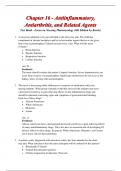
-
Chapter 16 - Antiinflammatory, Antiarthritis, and Related Agents |Test Bank - Focus on Nursing Pharmacology (8th Edition by Karch)
- Examen • 13 pages • 2024
-
Disponible en pack
-
- 4,37 €
- + en savoir plus
1. A nurse has admitted a 10-year-old child to the short-stay unit. The child has complained of chronic headaches and his or her mother reports that he or she gives him or her acetaminophen (Tylenol) at least twice a day. What will the nurse evaluate? a. Renal function b. Hepatic function c. Respiratory function d. Cardiac function Ans: B Feedback: The nurse should evaluate the patient’s hepatic function. Severe hepatotoxicity can occur from overuse of acetaminophen. Significant inter...
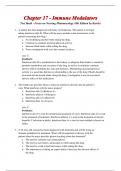
-
Chapter 17 - Immune Modulators |Test Bank - Focus on Nursing Pharmacology (8th Edition by Karch)
- Examen • 14 pages • 2024
-
Disponible en pack
-
- 4,39 €
- + en savoir plus
1. A patient has been diagnosed with hairy cell leukemia. The patient is to begin taking interferon alfa 2b. What will the nurse include in her instructions to the patient concerning this drug? a. Avoid drinking alcohol while taking the drug. b. Continue to maintain maximal physical activity. c. Increase fluid intake while taking the drug. d. Treat constipation with over-the-counter laxatives. Ans: C Feedback: Interferon alfa 2b is metabolized in the kidney so adequate fluid intake is ...
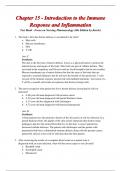
-
Chapter 15 - Introduction to the Immune Response and Inflammation |Test Bank - Focus on Nursing Pharmacology (8th Edition by Karch)
- Examen • 14 pages • 2024
-
Disponible en pack
-
- 4,38 €
- + en savoir plus
1. The body’s first-line barrier defense is considered to be what? a. Mast cells b. Mucous membranes c. Skin d. T cells Ans: C Feedback: The skin is the first line of barrier defense. It acts as a physical barrier to protect the internal tissues and organs of the body. Mast cells are part of cellular defense. They are found in the respiratory and GI tracts and are fixed basophils that do not circulate. Mucous membranes are a barrier defense that line the areas of the body that are exp...
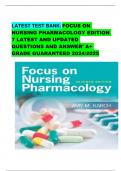
-
LATEST TEST BANK: FOCUS ON NURSING PHARMACOLOGY EDITION 7 LATEST AND UPDATED QUESTIONS AND ANSWER’ A+ GRADE GUARANTEED 2024/2025
- Examen • 38 pages • 2024
-
- 14,20 €
- + en savoir plus
LATEST TEST BANK: FOCUS ON NURSING PHARMACOLOGY EDITION 7 LATEST AND UPDATED QUESTIONS AND ANSWER’ A+ GRADE GUARANTEED 2024/2025 Chapter 01- Introduction to Drugs 1.A nurse working in radiology administers iodine to a patient who is having a computed tomography (CT) scan. The nurse working on the oncology unit administers chemotherapy to patients who have cancer. At the Public Health Department, a nurse administers a measles-mumps-rubella (MMR) vaccine to a 14-month-old child as a ro...
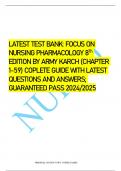
-
LATEST TEST BANK: FOCUS ON NURSING PHARMACOLOGY 8Th EDITION BY ARMY KARCH (CHAPTER 1-59) COMPLETE GUIDE WITH LATEST QUESTIONS AND ANSWERS; GUARANTEED PASS 2024/2025
- Examen • 992 pages • 2024
-
- 23,38 €
- + en savoir plus
LATEST TEST BANK: FOCUS ON NURSING PHARMACOLOGY 8Th EDITION BY ARMY KARCH (CHAPTER 1-59) COPLETE GUIDE WITH LATEST QUESTIONS AND ANSWERS; GUARANTEED PASS 2024/2025 ORIGINAL DO NOT COPY. NURSE JAMES ORIGINAL DO NOT COPY. NURSE JAMES ORIGINAL DO NOT COPY. NURSE JAMES Test Bank - Focus on Nursing Pharmacology (8th Edition by Karch) 1 Table of Contents Table of Contents Chapter 01 - Introduction to Drugs Chapter 02 - Drugs and the Body Chapter 03 - Toxic Effects of Drugs Chapter 04 - ...
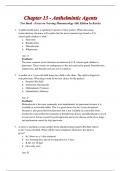
-
Chapter 13 - Anthelmintic Agents |Test Bank - Focus on Nursing Pharmacology (8th Edition by Karch)
- Examen • 13 pages • 2024
-
Disponible en pack
-
- 4,37 €
- + en savoir plus
1. A public health nurse is speaking to parents of first graders. When discussing worm infection, the nurse will explain that the most common type found in U.S. school-aged children is what? a. Pinworms b. Roundworms c. Threadworms d. Whipworms Ans: A Feedback: The most common worm infection encountered in U.S. school-aged children is pinworms. These worms are endogenous to the area and easily spread. Roundworms, whipworms, and threadworms are not as common. 2. A mother of a 3-year-o...
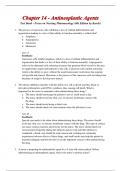
-
Chapter 14 - Antineoplastic Agents |Test Bank - Focus on Nursing Pharmacology (8th Edition by Karch)
- Examen • 14 pages • 2024
-
Disponible en pack
-
- 4,39 €
- + en savoir plus
1. The process of cancerous cells exhibiting a loss of cellular differentiation and organization leading to a loss of their ability to function normally is called what? a. Anaplasia b. Angiogenesis c. Autonomy d. Metastasis Ans: A Feedback: Cancerous cells exhibit anaplasia, which is a loss of cellular differentiation and organization that leads to a loss of their ability to function normally. Angiogenesis refers to the abnormal cells releasing enzymes that generate blood vessels in the...
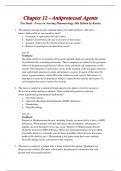
-
Chapter 12 - Antiprotozoal Agents |Test Bank - Focus on Nursing Pharmacology (8th Edition by Karch)
- Examen • 13 pages • 2024
-
Disponible en pack
-
- 4,36 €
- + en savoir plus
1. The patient is having an acute malarial attack with chills and fever. The nurse knows chills and fever are caused by what? a. Formation of sporozoites into the system b. Rupture of red blood cells due to invasion of merozoites c. Invasion of the tsetse fly into the central nervous system d. Release of amastigotes into the blood vessels Ans: B Feedback: The chills and fever associated with an acute malarial attack are caused by the rupture of red blood cells containing merozoites. The...
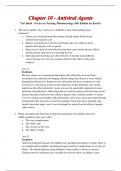
-
Chapter 10 - Antiviral Agents |Test Bank - Focus on Nursing Pharmacology (8th Edition by Karch)
- Examen • 14 pages • 2024
-
Disponible en pack
-
- 4,38 €
- + en savoir plus
1. The nurse explains why viruses are so difficult to treat when making what statement? a. Viruses are contained inside the human cell and cannot be destroyed without destroying the cell. b. Release of interferons by the host cell makes the virus replicate more quickly allowing the virus to spread. c. Drugs exist to treat all viral infections but they carry serious adverse effects and the benefit often does not outweigh the risk. d. Individual antiviral drugs are often effective in treating ...
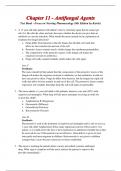
-
Chapter 11 - Antifungal Agents |Test Bank - Focus on Nursing Pharmacology (8th Edition by Karch)
- Examen • 13 pages • 2024
-
Disponible en pack
-
- 4,37 €
- + en savoir plus
1. A 17-year-old male patient with athlete’s foot is extremely upset that he cannot get rid of it. He calls the clinic and asks the nurse whether the doctor can give him an antibiotic to cure the infection. What should the nurse include in the explanation of treatment for fungal infections? a. Fungi differ from bacteria in that the fungus has flexible cell walls that allow for free transfer into and out of the cell. b. Protective layers contain sterols, which change the membrane permeability...

Ce résumé que vous venez d'acheter a fait très plaisir à quelqu'un. Vous voulez aussi être payé chaque semaine ? Vendez vos documents d'étude sur Stuvia ! Découvrez tout sur gagner de l'argent sur Stuvia


